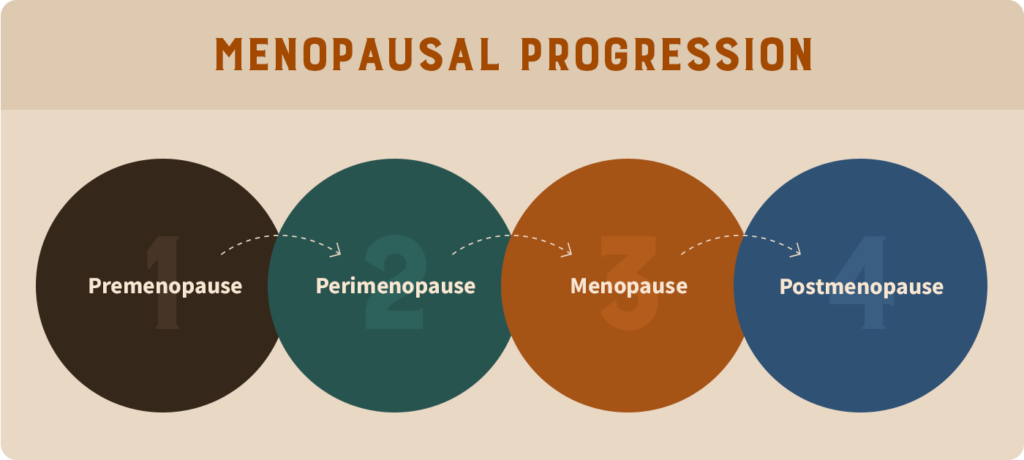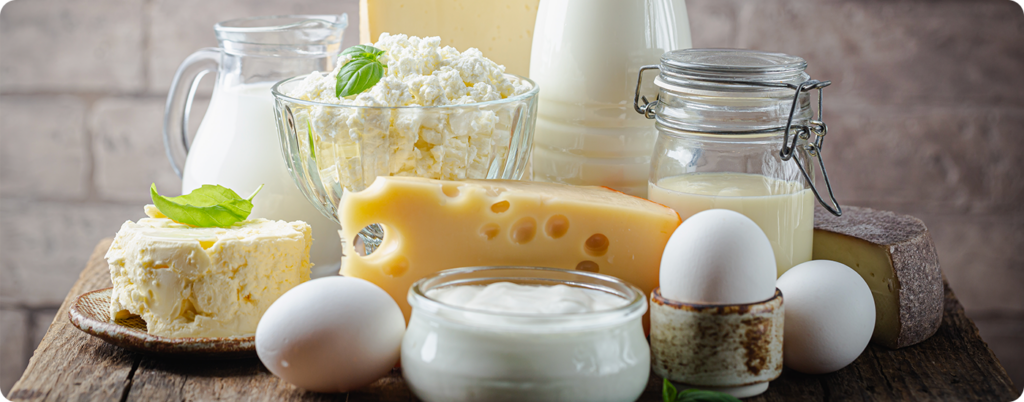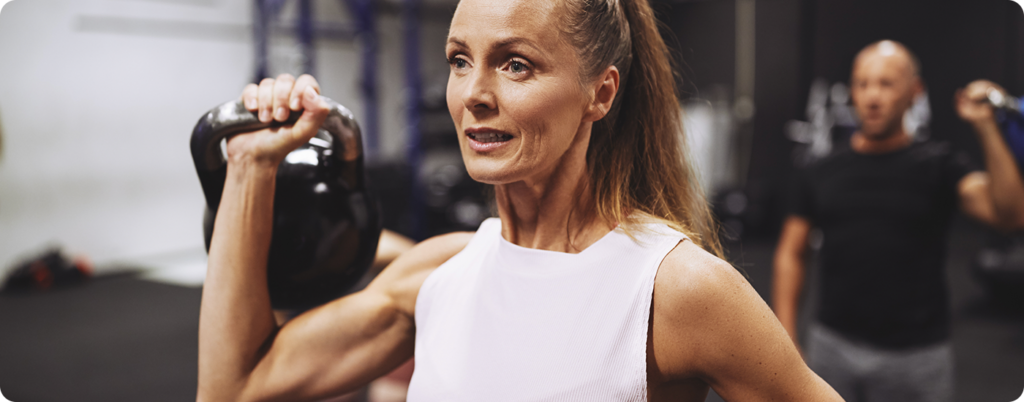MEDICAL DISCLAIMER: The information in this blog is for educational purposes only. It is not a substitute for professional medical advice. Consult your healthcare provider if you’re seeking medical advice, diagnoses, or treatment.
What this article covers…
- A brief discussion of perimenopause and beyond
- Key nutrients and lifestyle practices during perimenopause
- Supplements we suggest
- Additional resources to learn more about hormonal health
Reproductive health for women includes more than the ability to conceive and bear children. The primary hormones estrogen and progesterone that regulate the menstrual cycle are involved in many other functions, such as weight loss/gain, bone health, mood, libido, and more. As women age, the production cycles of their hormones change.
Many women have a signature menstrual pattern during their prime childbearing years. This includes the time between cycles, the intensity of menstrual symptoms, and when ovulation occurs. When this pattern begins to shift, it is a signal that hormone levels are shifting as well.
Although challenging, this phase of life is normal and healthy.
It’s referred to as perimenopause, which normally lasts between 5-15 years. During perimenopause, a woman can still conceive and bear children, but she is approaching the end of that time. When a woman has gone 12 months without a menstrual cycle, she has reached menopause.
The Role of Nutrition During Perimenopause & Beyond
When women enter the perimenopausal stage, they often feel the need to make lifestyle changes. The habits and behaviors that “worked” in the pre-menopausal stage (before any irregularity in hormones becomes noticeable) may no longer achieve the same results.
Side note: People sometimes use the term “premenopause” when a woman first experiences irregular menstrual cycles and mood swings. Premenopause is not a medical term but generally refers to the phase of life from a woman’s first period to the onset of menopausal symptoms. By contrast, perimenopause applies to when a woman sees the earliest signs of menopause. The sequence goes like this: premenopause => perimenopause => menopause => postmenopause.

The decline in estrogen, specifically estradiol, is important because it affects your body’s ability to build strong, pliable, fully mineralized bones. Without sufficient levels of estradiol, osteoporosis sets in.
One way to offset this is to consume specific nutrients to support hormone production and other systems. Another way is to develop a practice of strength training. The healthy stress of strength training stimulates bone and muscle repair, regenerating those tissues even without the signal that estradiol usually provides.
5 Nutrient & Lifestyle Tips for Perimenopause
Perimenopause can feel disorienting. As your rhythms get disrupted, your body cannot draw from the same hormone levels it once did. Rather than attempting to correct any hormone imbalances with synthetic hormones (something only your doctor would be qualified to recommend), we suggest feeding your body with the macro and micronutrients that support the balanced production of hormones such as progesterone, testosterone, and estrogen.
Let’s unpack some natural principles for establishing a diet and lifestyle that helps you feel good during perimenopause:
1. Calcium
The battle against bone loss (osteoporosis) starts during perimenopause. Osteoporosis is a disease that results in reduced bone strength and increased susceptibility to fractures. An estimated 80% of fractures are osteoporosis-related (1).
Women tend to have smaller and thinner bones than men (2). They can also experience accelerated rates of bone loss before and throughout menopause.
Your best weapons in that battle include the fat-soluble nutrients found in organs, which support healthy calcium metabolism. Physical activity is another primary tool to prevent osteoporosis (3).
Conventional health wisdom may point you toward calcium-rich plants such as edamame, leafy greens, fortified grain-based foods, and juice. With vegetables such as kale, collards, spinach, and bok choy, your body contends with oxalates and phytates that prevent full absorption of other minerals such as zinc, selenium, and magnesium. So, receiving the full benefit of the minerals in those foods is difficult.
Dairy can provide lots of bio-available calcium, especially raw dairy. Bones are another fantastic calcium source.

Most calcium supplements use synthetic formulas and don’t provide the most bio-available ratio of this mineral with phosphorus and other critical nutrients.
MCHA from bovine bones has scientifically demonstrated its effectiveness at slowing the loss of bone mineral density in postmenopausal women, improving symptoms of bone pain in those with osteoporosis/arthritis, and slowing the progression of osteoporosis. If you don’t do well with dairy, Bone Matrix can be a great alternative source of calcium.
2. Vitamin K2
This critical fat-soluble nutrient prevents the accumulation of calcium in arterial walls and ensures correct placement in our bodies, namely within bones and teeth. As with many vitamins, K comes in multiple forms. Not all forms of vitamin K are equally bioavailable or beneficial.
Many believe they get enough vitamin K through plant foods, but this is unlikely.
In plants, vitamin K exists as K1, or phylloquinone, which is not as beneficial to the health of our bones, calcium metabolism, and inhibition of arterial calcification. Luckily, well-raised animal organs and muscle meat provide ample K2, the superior form. Vitamin K2 is especially concentrated in the liver, so we include liver in many of our supplements, including Her Package and Bone Marrow & Liver.
3. Vitamin D
Stepping outdoors and exposing your body to direct sunlight and UV light (learn more about light exposure in Paul Saladino, MD’s podcast) stimulates vitamin D and nitric oxide synthesis in the skin. This helps calcium absorption, regulates hormones, helps decrease blood pressure, and increases blood flow throughout the body.
Exposure to the sun daily can also help your body enter its natural circadian rhythm cycle, promoting better sleep, recovery, and muscle growth.
If you don’t live in any area with consistent sunlight, many benefit from supplementing with organic vitamin D3.
4. Strength Training
Strength training is a fantastic way to stimulate your body’s natural growth and repair processes, especially for bone health! Going for walks with a bit of extra weight (such as a rucksack or weighted vest) gives you the benefits of walking and the additional resistance of weights.

Exercise becomes even more crucial given its positive impact on muscle mass and bone density (4). Strategies like breathing exercises, yoga, or walking can also go a long way towards reducing stress.
Find a form of exercise that you enjoy doing! This might look like long walks, group fitness classes, dancing, or strength-training sessions with a personal trainer.
5. Animal-Based Nutrition
Incorporating well-raised meat and organs into your diet is a delightful way to get your body’s macro (protein, fat) and micro (vitamins, minerals, peptides) nutrients. We suggest you focus on meat and organs from grass-fed ruminant animals such as cattle, buffalo, goat, lamb, and deer as part of an animal-based diet.
If you consume poultry, eggs, or pork, stick with free-range or pasture-raised options. Industrial farms rely on cheap corn and soy-based feeds to raise and fatten their animals. Even “organically raised” animals may be fed organic corn and soy — resulting in a buildup of linoleic acid in their fat tissues.
A properly constructed nose-to-tail, animal-based diet can be an incredible approach for any woman (pre-/peri-/post-menopause). The rich source of bioavailable fat-soluble vitamins (A, D, E, and K2), B vitamins (especially B6, B12, riboflavin, and folate), and minerals, like zinc and selenium, all play vital roles in proper hormone metabolism and function.
Perimenopause Supplements: What We Recommend
Organs are nutritional powerhouses, but they’re often overlooked or discarded. We always suggest consuming fresh organs if possible. If not, our supplements are a great alternative. We commonly suggest the following options.
1. Her Package
Formulated from the principle that “like supports like,” Her Package contains bovine ovaries, fallopian tubes, uterus, liver, and kidney. This combination supplies important tissue-specific nutrients, proteins, and peptides—like activin, inhibin, and follistatin. It also contains vitamins A, D, E, and K2, collagen peptides, and growth factors VEGF and bFGF.
Her Package provides foundational nutrition for optimal female health at any stage of life, especially during perimenopause when the body isn’t producing critical hormones at the same levels.
Introducing Her Package slowly is important because the ingredients can have a powerful effect. We suggest you start with one capsule every other day for two weeks. Then, increase by one capsule every two weeks. Many women feel best taking just one capsule per day indefinitely.
2. Bone Matrix
Osteoporosis is a common symptom for women going through menopause and afterward. Critically, it contains bioavailable calcium and phosphorus in the optimum 2:1 ratio.
Bone Matrix provides minerals, peptides, and growth factors in naturally occurring, microcrystalline hydroxyapatite (MCHA) form.
Bone Marrow & Liver makes a fantastic addition to the perimenopausal stack of supplements. It contains red and yellow bone marrow to support the formation of red blood cells, cartilage cells (chondrocytes), bone cells (osteocytes, osteoblast & osteoclasts), and other vital tissues found throughout the body. It also includes the omega-3 fatty acids, EPA and DHA, alkylglycerols, adiponectin, hormones, growth factors, peptides, and other micronutrients.
Additional Perimenopause Resources:
1. Podcast: Will a low carb/carnivore diet WRECK YOUR HORMONES? (110 minutes, YouTube)
In his first episode with Jaime Seeman, MD, Paul Saladino, MD, talks about athletes and nutrition, how low-carb and keto diets affect hormones, insulin resistance, and how to fix hormone issues that many women face. Dr. Seeman is a board-certified obstetrician and gynecologist practicing in Omaha, Nebraska.
She is currently in private practice at Mid City OBGYN, offering a full range of services in obstetrics, gynecology, robotic surgery, and primary care. She is a fellow in Integrative Medicine at The University of Arizona School of Medicine. She is also one of the country’s first board-certified ketogenic nutrition specialists.
2. Podcast: Fertility, Pre-natal, Pregnancy, Breast Feeding and Peri-menopause with Jaime Seeman, MD (89 minutes, YouTube)
In his second episode with Jaime Seeman, MD, Paul Saladino, MD, tackles hormones, nutrition, breastfeeding, and many other fertility and pregnancy-related topics.
3. Podcast: The keys to weight loss and hormonal health for women (and men!) of all ages with Karen Martel (104 minutes, YouTube)
In this episode with Karen Martel, Paul Saladino, MD, goes in-depth on many women’s health issues, including the menstrual cycle, heavy metal toxicity, perimenopause, metabolic dysfunction, and how to think about carbohydrates if you’re trying to lose weight.
Karen Martel is a Transformational Nutrition Coach who is a leading expert in ancestral nutrition, weight-loss resistance, and women’s hormone health. Karen’s passion is helping women break through weight-loss resistance and find their weight-loss code through hormone optimization. Karen is a health leader and researcher determined to revolutionize weight loss for modern women and men.
4. Podcast: How Broccoli is Destroying Your Thyroid! with Elle Russ (108 minutes, YouTube)
Elle Russ shares her incredible and heartbreaking thyroid and hormone dysfunction journey. She talks about her experience with conventional medicine misdiagnosing and subsequently mistreating her condition. Finally, she uncovered a world of people battling thyroid issues and healing those issues with diet and supplemental hormones. Elle Russ is a bestselling author, TV/film writer, and seasoned life coach. She is the author of Confident As Fu*k and The Paleo Thyroid Solution – a book that has helped thousands worldwide reclaim their health.
5. Podcast: How to fix your broken Thyroid for optimal sexual health and weight loss (110 minutes, YouTube)
In Elle Russ’ second episode with Paul Saladino, MD, their discussion is a DEEP dive into the world of thyroid health and proper nutritional support for people suffering from thyroid issues.
Subscribe to future articles like this: